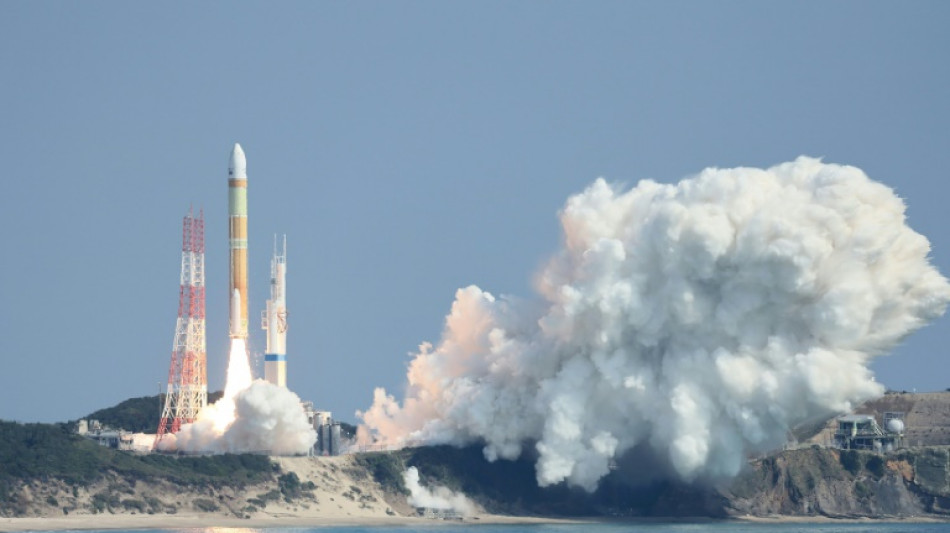
-
 Veteran Monfils exits to standing ovation on Australian Open farewell
Veteran Monfils exits to standing ovation on Australian Open farewell
-
Precision-serving former finalist Rybakina powers on in Melbourne

-
 South Korea's women footballers threaten boycott over conditions
South Korea's women footballers threaten boycott over conditions
-
Equities sink, gold and silver hit records as Greenland fears mount

-
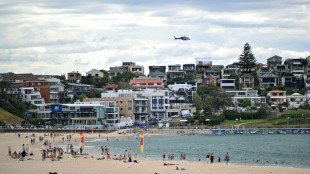 Australian lawmakers back stricter gun, hate crime laws
Australian lawmakers back stricter gun, hate crime laws
-
EU wants to keep Chinese suppliers out of critical infrastructure

-
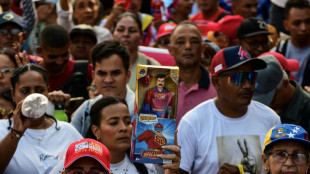 AI reshaping the battle over the narrative of Maduro's US capture
AI reshaping the battle over the narrative of Maduro's US capture
-
Penguins bring forward breeding season as Antarctica warms: study

-
 Vietnam leader pledges graft fight as he eyes China-style powers
Vietnam leader pledges graft fight as he eyes China-style powers
-
Ukrainian makes soldier dad's 'dream come true' at Australian Open

-
 'Timid' Keys makes shaky start to Australian Open title defence
'Timid' Keys makes shaky start to Australian Open title defence
-
Indiana crowned college champions to complete fairytale season

-
 South Koreans go cuckoo for 'Dubai-style' cookies
South Koreans go cuckoo for 'Dubai-style' cookies
-
Harris leads Pistons past Celtics in thriller; Thunder bounce back

-
 Tjen first Indonesian to win at Australian Open in 28 years
Tjen first Indonesian to win at Australian Open in 28 years
-
Long-delayed decision due on Chinese mega-embassy in London

-
 Djokovic jokes that he wants slice of Alcaraz's winnings
Djokovic jokes that he wants slice of Alcaraz's winnings
-
Trump tariff threat 'poison' for Germany's fragile recovery

-
 Tourists hit record in Japan, despite plunge from China
Tourists hit record in Japan, despite plunge from China
-
Jittery Keys opens Melbourne defence as Sinner begins hat-trick quest

-
 The impact of Trump's foreign aid cuts, one year on
The impact of Trump's foreign aid cuts, one year on
-
Belgian court weighs trial for ex-diplomat over Lumumba killing

-
 Inside China's buzzing AI scene year after DeepSeek shock
Inside China's buzzing AI scene year after DeepSeek shock
-
Asian markets sink, silver hits record as Greenland fears mount

-
 Shark bites surfer in Australian state's fourth attack in 48 hours
Shark bites surfer in Australian state's fourth attack in 48 hours
-
North Korea's Kim sacks vice premier, rails against 'incompetence'
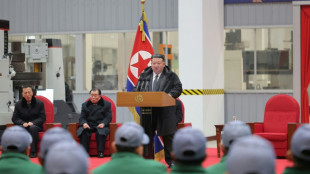
-
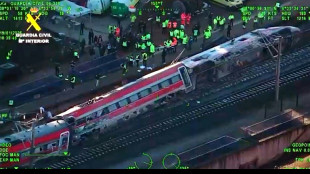 Spain mourns as train crash toll rises to 40
Spain mourns as train crash toll rises to 40
-
'Very nervous' Keys makes shaky start to Australian Open title defence

-
 Vietnam leader promises graft fight as he eyes China-style powers
Vietnam leader promises graft fight as he eyes China-style powers
-
Dad-to-be Ruud ready to walk away from Australian Open

-
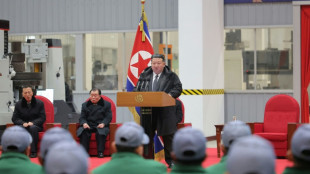 North Korea's Kim sacks senior official, slams 'incompetence'
North Korea's Kim sacks senior official, slams 'incompetence'
-
Farewells, fresh faces at Men's Fashion Week in Paris

-
 'I do not want to reconcile with my family' says Brooklyn Peltz Beckham
'I do not want to reconcile with my family' says Brooklyn Peltz Beckham
-
EU leaders take stage in Davos as Trump rocks global order

-
 Blast at Chinese restaurant in Kabul kills 7
Blast at Chinese restaurant in Kabul kills 7
-
Warner hits 'Sinners' and 'One Battle' tipped for Oscar nominations

-
 Colombian paramilitary-turned-peace-envoy sentenced over atrocities
Colombian paramilitary-turned-peace-envoy sentenced over atrocities
-
Gilgeous-Alexander leads Thunder in rout of Cavaliers

-
 Seahawks blow as Charbonnet ruled out for rest of season
Seahawks blow as Charbonnet ruled out for rest of season
-
Kostoulas stunner rescues Brighton draw after penalty row

-
 Man Utd greats tell Martinez to 'grow up' as feud rumbles on
Man Utd greats tell Martinez to 'grow up' as feud rumbles on
-
LeBron James' All-Star streak over as starters named

-
 Allies tepid on Trump 'peace board' with $1bn permanent member fee
Allies tepid on Trump 'peace board' with $1bn permanent member fee
-
Ninth policeman dies in Guatemala gang riots, attacks

-
 Man City's Foden to play through pain of broken hand
Man City's Foden to play through pain of broken hand
-
Milan Fashion Week showcases precision in uncertain times

-
 Public media in Europe under unprecedented strain
Public media in Europe under unprecedented strain
-
Africa Cup of Nations refereeing gets a red card

-
 Tributes pour in after death of Italian designer Valentino
Tributes pour in after death of Italian designer Valentino
-
Bills fire coach McDermott after playoff exit: team


Japan's new H3 rocket fails again, forced to self-destruct
Japan's second attempt to launch its next-generation H3 rocket failed after liftoff on Tuesday, with the spacecraft forced to self-destruct after the command centre concluded the mission could not succeed.
The failure is a blow for Japan's space agency JAXA, which has billed the rocket as a flexible and cost-effective new flagship.
Its launch had already been delayed by several years, and then a first attempt last month failed when the solid rocket boosters did not ignite.
Tuesday's launch from the Tanegashima Space Center in southwestern Japan initially appeared to be a success, with the rocket lifting off.
The first-stage separation appeared to go as planned, but signs of trouble soon emerged.
"It seems that the velocity is coming down," announcers on the JAXA live feed said while the rocket was about 300 kilometres (185 miles) above ground.
The command centre then announced: "The second stage engine ignition has not been confirmed yet, we continue to confirm the situation."
The live feed was briefly halted, with a message reading, "We are currently checking the status. Please wait."
When it resumed, the command centre confirmed the bad news.
"Destruct command has been transmitted to H3 because there was no possibility of achieving the mission."
The rocket was not going to reach its planned trajectory without confirmation of the second stage engine, JAXA Vice President Yasuhiro Funo told a news conference.
Debris from the destroyed rocket is believed to have fallen in waters east of the Philippines, he said.
- 'Efforts to restore confidence' -
The cause of the failure will be investigated, said JAXA President Hiroshi Yamakawa.
"When a failure like this happens, it is important that we show how quickly we can move and show our findings with transparency," he said.
"My responsibility is to focus on discovering the cause and make efforts to restore confidence in our rockets.
The H3 rocket was developed for more frequent commercial launches as well as better cost efficiency and reliability and has been mooted as a possible competitor to Space X's Falcon 9.
"The H3 rocket is a very important rocket for not only the government of Japan but also for private sector businesses to access space," Yamakawa said.
JAXA has said it envisions the H3 becoming a workhorse that could be launched six times or so annually for around two decades.
There were no details on how long the investigation into the failure might take and whether or when JAXA could attempt a new launch.
Developed by Mitsubishi Heavy Industries, the H-3 is the successor to the H-IIA model, which debuted in 2001.
Tuesday's launch was carrying the ALOS-3 observation satellite, touted as having improved resolution and intended to help with disaster management and other monitoring.
The incident is not the only recent blow for JAXA.
In October 2022, the agency was forced to send a self-destruct order to its solid-fuel Epsilon rocket after take-off. It was carrying satellites into orbit to demonstrate new technologies.
That was Japan's first failed rocket launch since 2003.
The Epsilon rocket has been in service since 2013. It is smaller than the country's previous liquid-fuelled model, and a successor to the solid-fuel "M-5" rocket that was retired in 2006 due to its high cost.
N.Fournier--BTB



